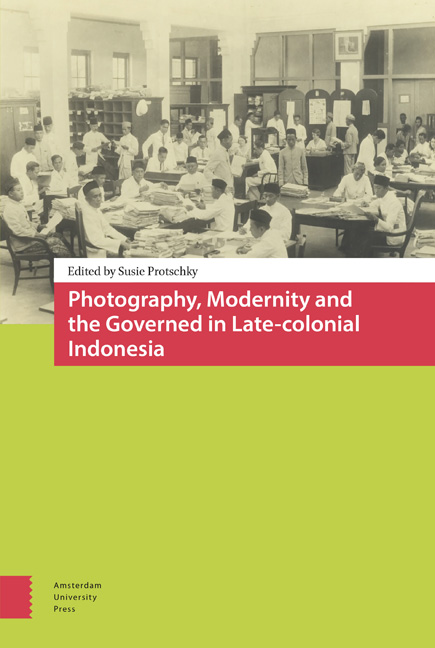Book contents
- Frontmatter
- Contents
- Acknowledgments
- Part I Governing Lenses on Ethical Policy and Practice
- 1 Camera Ethica: Photography, modernity and the governed in late-colonial Indonesia
- 2 Ethical policies in moving pictures: The films of J.C. Lamster
- 3 Ethical projects, ethnographic orders and colonial notions of modernity in Dutch Borneo: G.L. Tichelman's Queen's Birthday photographs from the late 1920s
- 4 Saving the children?: The Ethical Policy and photographs of colonial atrocity during the Aceh War
- Part II Local Lenses on Living in an “Ethical” Indies
- 5 Interracial unions and the Ethical Policy: The representation of the everyday in Indo-European family photo albums
- 6 Reversing the lens: Kartini's image of a modernised Java
- 7 Modelling modernity: Ethnic Chinese photography in the ethical era
- 8 Modernity and middle classes in the Netherlands Indies: Cultivating cultural citizenship
- 9 Say “cheese”: Images of captivity in Boven Digoel (1927-43)
1 - Camera Ethica: Photography, modernity and the governed in late-colonial Indonesia
Published online by Cambridge University Press: 11 December 2020
- Frontmatter
- Contents
- Acknowledgments
- Part I Governing Lenses on Ethical Policy and Practice
- 1 Camera Ethica: Photography, modernity and the governed in late-colonial Indonesia
- 2 Ethical policies in moving pictures: The films of J.C. Lamster
- 3 Ethical projects, ethnographic orders and colonial notions of modernity in Dutch Borneo: G.L. Tichelman's Queen's Birthday photographs from the late 1920s
- 4 Saving the children?: The Ethical Policy and photographs of colonial atrocity during the Aceh War
- Part II Local Lenses on Living in an “Ethical” Indies
- 5 Interracial unions and the Ethical Policy: The representation of the everyday in Indo-European family photo albums
- 6 Reversing the lens: Kartini's image of a modernised Java
- 7 Modelling modernity: Ethnic Chinese photography in the ethical era
- 8 Modernity and middle classes in the Netherlands Indies: Cultivating cultural citizenship
- 9 Say “cheese”: Images of captivity in Boven Digoel (1927-43)
Summary
Camera Ethica: Re-envisioning a period of “ethical” colonial reform
“Ethical Policy” (Ethische Politiek) is the term frequently used by historians to indicate the suite of liberal-developmentalist reforms debated and implemented by Dutch colonial elites in early-twentieth-century Indonesia (c. 1901- 42), then the Netherlands East Indies. The reforms have a wellestablished intellectual history in the Dutch-language literature, where their social and cultural trajectory has conventionally been traced through the words and texts of (mainly Dutch) elites. Yet despite the Ethical Policy’s ideological resonance and temporal coincidence with other forms of European liberal imperialism – notably the “white man's burden” of the Anglophone world and the French mission civilisatrice– the Dutch program in the Indies is little known outside a narrow specialist field. This volume aims to revise current understandings of the Indies reforms by re-examining them through a significant yet neglected photographic source base, and in the process to introduce the Ethical Policy to a wider community of scholars on European colonialism.
Specifically, the essays in this volume focus on the photographic works of the lower officials who implemented the policy “on the ground” and, importantly, the Indies people over whom colonial elites presumed to govern. In doing so, the contributors argue that the articulation, relevance and, ultimately, success or failure of the Ethical Policy was contingent on more than the moral, intellectual and political concerns of the Dutch elite who conceived and debated the reforms. Contests over the aims, nature and extent of the Ethical Policy, and competing visions of the kind of future it might bring, were formulated in the social and cultural realms of a larger, more diverse Indies population than extant studies have accounted for.
In two regards, photographs provide unique historical access to the various “life worlds” of Indies peoples from different classes, ethnicities, religions, genders and language backgrounds. First, the Ethical Policy commenced when photography began to circulate in the media and among amateur practitioners in the Netherlands Indies at an historically unprecedented range and volume following advancements to the camera, the image development process, and printing and reproduction technologies. Second, the key promises of the Ethical Policy to Indies people resonated uniquely with the qualities then associated with photography.
- Type
- Chapter
- Information
- Publisher: Amsterdam University PressPrint publication year: 2015



